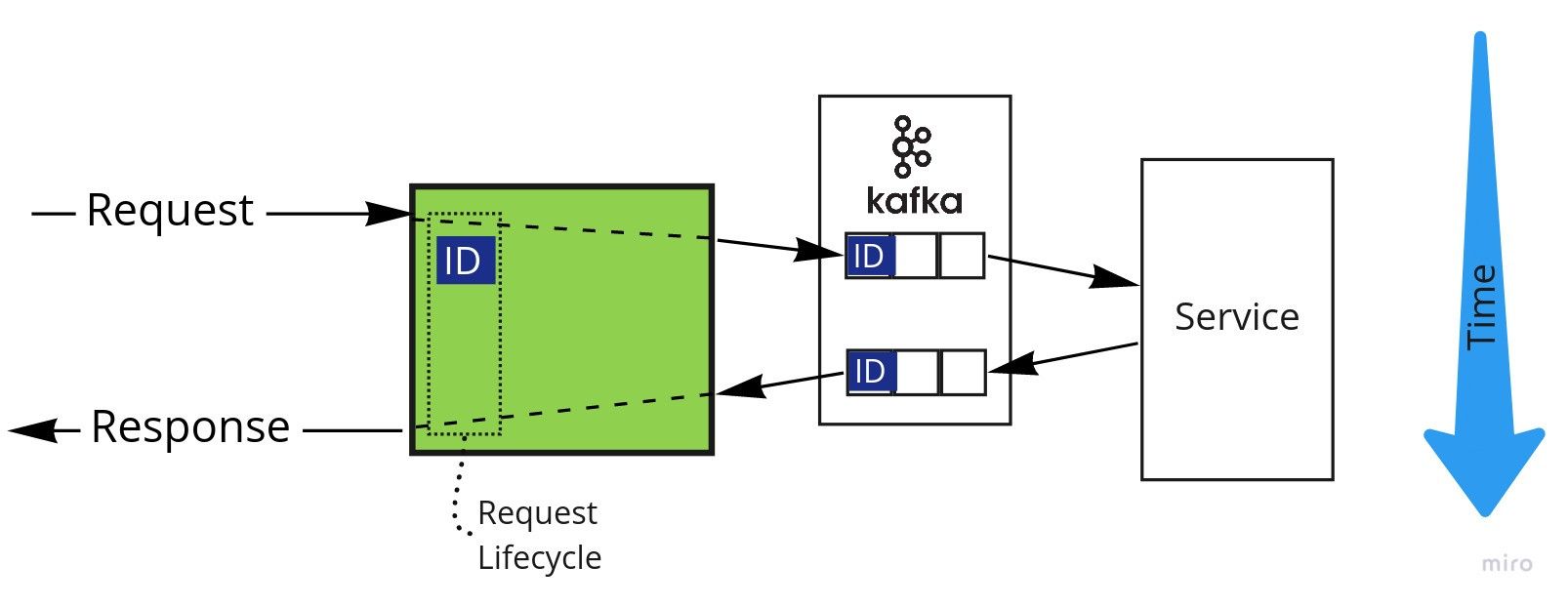A easy HTTP<->Kafka gateway with a complete config file and swagger generation.
Download the franz-<VERSION>-standalone.jar from the releases tab and run the jar with the config files with the command:
java -Dlog4j.configurationFile=<path-to>/log4j2.xml -Dconfig=<path-to>/config.edn -jar franz-<VERSION>-standalone.jarCheck the config files in the example-config folder.
- Request-response (the default mode)
The kafka producer will insert a
http-response-idfield to the root of the input payload to be sent to kafka on thesend-topic. The HTTP connection will keep waiting for a message on thelisten-topicwith thehttp-response-idfield, when we receive the message it will be returned to http. The consumer optionally accepts ahttp-statuswhich is the status code to be passed on the http response, if no http-status is given will be returned a 200. - Fire and forget
The HTTP payload will be sent to
send-topicas is and will return instantly a 200, no consumer is instantiated.
Explained config.edn:
{;Default kafka configs
;The kafka section contain all the java properties to control both consumer and producer. The same as the property files.
;they can be overwritten per route on the 'routes' section
:kafka {:consumer {"bootstrap.servers" "localhost:9092"
"group.id" "test"
"auto.offset.reset" "latest"
"enable.auto.commit" "true"
"key.deserializer" "org.apache.kafka.common.serialization.StringDeserializer"
"value.deserializer" "org.apache.kafka.common.serialization.StringDeserializer"
}
:producer {"bootstrap.servers" "localhost:9092"
"key.serializer" "org.apache.kafka.common.serialization.StringSerializer"
"value.serializer" "org.apache.kafka.common.serialization.StringSerializer"
}}
;Here we control some option of the http server
;in this config file we will evaluate all lists (note the parethesis syntax) as code
;
;
; !!!!!!!!! WARNING !!!!!!!!!!!
;
;
;Never read a config file in franz from an untrusted sources!!!!!
:http {:min-threads (+ 8 8)
:max-threads 100
:max-idle-time (* 30 60 1000)
:request-header-size 8192
;We are using the juxt/aero config library to read the config files
;we can pass environment variables inside the config file, if no venv has passed will default to the second argument of the #or clause
:port #or [#env PORT 3000]
}
;Swagger options
:swagger {:enabled? true
:title "Franz Gateway"
:description "Connecting http to kafka"
:path "/"}
;Any option that is not given at the `routes` is replaced to one the these default values
:defaults {:create-topic? true; enable topic creation, set it to false to disable it. defaults to false.
:send-topic "default"
:listen-topic "default"
:poll-duration 200
:timeout 5000
:partitions 1
:replication 3
}
;The list of all routes
;Each route can have multiple http methods with individual configs
;all of the options here are optional and if not given will default to the values above.
:routes {"/test" {:post {:send-topic "poc"
:listen-topic "poc"
;time to return a timeout on http
:timeout 2000
:partitions 1
:replication 3
;Poll interval on the consumer loop
:poll-duration 100;milliseconds
:summary "test" ;swagger summary of the route
;Here we can list and validate all the info given to the route.
;This option is optional, if not given will pass the input to kafka without any validation
:parameters {:body
;Here we are using malli specs.
;These specs will be documented on swagger
[:and
[:map
[:x [:and int? [:> 6]]]
[:y number?]]
;When using functions to validate always provide a :error/message as well
;or else the spec will fail with a "unknown error" message.
[:fn {:error/message "x should be greater than y"} (fn [{:keys [x y]}] (> x y))]]
:query [:map
[:id string?]]}
}
:get {:send-topic "poc2"
:listen-topic "poc2"
:timeout 2000
:poll-duration 100
:parameters {:query [:map [:number [:and int? [:> 6]]]]}
:flush? false; flush messages after being sent by the producer, defaults to true
:summary "testing get"
}}
"/fire-and-forget/" {:post {:send-topic "maaaaaaaaaaaano"
:listen-topic "maaaaaaaaaaaano"
:timeout 2000
:poll-duration 100;milliseconds
:serialization {:type :json}
:summary "fire and forget route"
; Operation mode, can be :request-response or :fire-and-forget, defaults to :request-response if not available
:mode :fire-and-forget
}}
; Avro serialization
"/avro" {:post {:send-topic "avro"
;We can define kafka configs per route as well
;these maps will be merged against the kafka configs above, per-route configs prevail
:consumer {"group.id" (str "prefix-" (java.util.UUID/randomUUID))
"auto.offset.reset" "latest"
"key.deserializer" "org.apache.kafka.common.serialization.ByteArrayDeserializer"
"value.deserializer" "org.apache.kafka.common.serialization.ByteArrayDeserializer"
}
:producer {"key.serializer" "org.apache.kafka.common.serialization.ByteArraySerializer"
"value.serializer" "org.apache.kafka.common.serialization.ByteArraySerializer"
}
:listen-topic "avro"
:timeout 2000
:poll-duration 100
:summary "Avro serialization"
:parameters {:body [:map [:name string?]
[:age int?]]}
:serialization {:type :avro ;can be :json or :avro, defaults to :json
;specs can be or in the map representation, or a path to the json spec.
;We are using the damballa/abracad library to handle avro serialization
;by default it translates all the fields in snake_case to lisp-case, set it to false to turn this behaviour off.
:mangle true
:producer-spec {:type :record
:name input
:fields [{:name :headers
:type {:type :map
:values :string}
}
{:name :uri
:type :string
}
{:name :http-response-id
:type :string
}
{:name :body
:type {:name :body-aux
:type :record
:fields [{:name :name
:type :string
}
{:name :age
:type :int
}
]}
}
]
}
;path relative to the jar folder
:consumer-spec "./example-config/avro.json"
}
}}
}}
This project is using Log4j2 to log, and accepts a log4j2 compatible config file.
Besides the logs inside Franz you can extract the logs inside the kafka and http library, although they are very verbose.
Check the example-config/log4j2.xml file for a example.
The logging config is optional, although is recommended to use.
It is now possible to inject code as data on the config file to improve the config file flexibility and power.
That being said, you should never read config files from untrusted sources!!!
If you are too uncorfortable with code evaluation in the config file, you can disable it setting :code-eval to false inside :defaults section.
With great power comes great responsibility.
You'll need leiningen installed, then:
lein uberjarCopyright © 2021 Lucas Severo
This program and the accompanying materials are made available under the terms of the Eclipse Public License 2.0 which is available at http://www.eclipse.org/legal/epl-2.0.
This Source Code may also be made available under the following Secondary Licenses when the conditions for such availability set forth in the Eclipse Public License, v. 2.0 are satisfied: GNU General Public License as published by the Free Software Foundation, either version 2 of the License, or (at your option) any later version, with the GNU Classpath Exception which is available at https://www.gnu.org/software/classpath/license.html.
